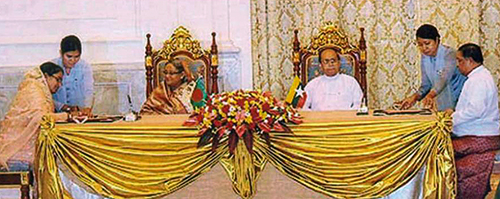Chittagong, Bangladesh: Bangladesh Prime Minister’s Hasina’s recent visit to Nay Pyi Taw is believed to have strengthened bilateral relations and boosted trade between the two countries, officials and traders said yesterday.

Bangladesh Foreign Minister Dr. Dipu Moni and Foreign Minister of Burma U Wunna Maung Lwin, ink a deal establishing a joint commission on trade cooperation at Naypaytaw on December 6. Bangladesh Prime Minister Sheikh Hasina and Burma’s U Thein Sein look on.
“We also believe that the new government in Myanmar, unlike previous administrations, is gradually opening up to the outside world, particularly with its neighbors,” an official continued.
Two accords were signed between the two countries for cooperation in the areas of trade and business along with the setting up of a joint business council.
"There are significant trade prospects with Myanmar, as the traders of that country are eager to cooperate with neighboring Bangladesh," said Murshed Murad Ibrahim, President of Chittagong Chamber of Commerce and Industry (CCCI).
Murad, a member of the Prime Minister's entourage, said Myanmar landowners wanted to engage in joint ventures with their Bangladeshi counterparts to cultivate arable land.
"We in the private sector could import over 200,000 tons of white rice within a very short time from Myanmar. That would keep the local market stable," Abul Bashar, a leading importer said.
Currently, the volume of annual trade between the two countries stands at an insignificant $185 million, mainly in favor of Burma, according to the Federation of Bangladesh Chambers of Commerce and Industry (FBCCI).
To promote trade, the Joint Trade commission (JTC) of Bangladesh and Burma held its 5th meeting on July 2011. It was agreed that the two countries would raise bilateral trade to $550 million.
At the JTC meeting, both countries agreed to increase the ceiling on transaction values to $50,000 per consignment from $30,000. Officials also discussed the potential for setting up wholesale border markets at Bangladesh's Teknaf border town and at Maungdaw, Burma.
Bangladesh mainly imports food items—rice, lentils and fish and timber—from Burma. It exports cement, pharmaceuticals, condensed milk, fabrics, construction materials and electric cables to Burma.
Most of these meager transactions take place at the Teknaf land port, situated at the bank of the Naff River, as there is no road link with Burma.
Bangladesh-Burma trade could not flourish during the past years due to absence of a banking system and proper connectivity, the traders said.
Bangladesh and Burma also discussed how using the Asian Clearing Union payment system complete border transactions as Bangladeshi importers now settle their payments for bulk shipments through bank drafts issued by foreign banks to third countries.
As both the governments have signed fresh accords to boost trade, these facilities are likely to be established, said Ministry of Foreign Affairs officials.
Although there are about 10 agreements between the two countries, including those in areas of land boundary management, trade, transport, and the prevention of narcotics, most exist only on paper except for the border agreement.
However, the volume of business transactions between the two countries through unofficial or illegal channels is at least four times higher than that of official ones, according to local businessmen.
Smugglers send fertilizers, petroleum products, medicines, and industrial equipment from Bangladesh to Burma, while they import food grains, fish, drugs, and liquor into Bangladesh.
Businessmen think that air and shipping links between Bangladesh and Burma will be established soon. Also a new road-link will be made.
Bangladesh will construct part of the proposed 23-km road from Taungbru to Bawali Bazar, as part of an agreement signed in 2007. Burma earlier promised to build a 105 km road to link Bawali Bazar in Maungdaw Township with Kyauktaw.
To improve relations, Burma has also agreed to take back stranded Rohingya refugees. Furthermore, a boundary dispute in the Bay of Bengal is also likely to be resolved by the middle of the next year, when an international arbitration panel of the United Nations is due to give its opinion. Both sides are ready to accept the opinion of the international arbitration, foreign ministry officials added.
“Bangladesh and Myanmar agreed to resolve any outstanding problems, including the Rohingya refugee issue and will enhance cooperation in energy, trade and investment, and regional connectivity,” said the Prime Minister Hasina, when she returned home on December 9.



